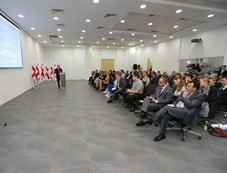Situation in occupied territory still on agenda
By Salome Modebadze
Wednesday, June 5


UNM member Giorgi Vashadze said first of all the session of the National Security Council should be held; secondly, the parliament should adopt a resolution over this issue; thirdly, the UNM and Georgian Dream should elaborate a joint document on how to work with the international community to make Russia adhere to international agreements and move the occupation line back again.
Vashadze said the UNM will also use all their contacts abroad to avoid Russia's wilful activities. “And we offer the (Georgian Dream) to have a coordinated working regime over this issue throughout the world,” he stated.
However, Chairman of the Parliamentary Legal Issues Committee, Vakhtang Khmaladze, said the relevant activities are underway. However, it needs time to make the “international machine” work on influencing Russia to prevent them from carrying out illegal activities.
Since the Russian border guards moved the border across the two villages of Gori last week, two Georgian residents remain jailed in Tskhinvali “for illegally crossing the border.”
NGOs believe the government should create certain mechanisms to improve the living conditions of people living across the border. Having personally visited the bordering villages, Kakha Kojoradze, Head of Georgian Young Lawyers Association (GYLA), said the farmers face problems in the legalization of their lands.
“We will by all means continue talking about the problems of these people with the government," Nino Lomjaria, Executive Director of International Society for Fair Elections and Democracy (ISFED) said, stressing that the families living across the occupation line are facing serious social problems.
On June 3, the Ministry of Internal Affairs of Georgia (MIA) expressed its concern over the installation of the barbed wire fences by the Russian occupation forces across the occupation line, calling it a clear violation of the fundamental principles of international law, primary of Georgia’s territorial integrity, inviolability of the internationally recognized borders, as well as the August 12, 2008 Cease Fire Agreement.
Introducing the diplomatic corps accredited in Georgia and international organizations on the issue, representative of the MIA’s Informational-Analytical Department stressed the importance of raising awareness of this fact to the rest of the world. On June 7, the MIA will organize their visit to the villages located near the administrative border line and receive information about the situation on the ground. However, Georgian analyst Khatuna Lagazidze thinks the reaction of the international community is a bit late in general. Lagazidze does not expect much pressure or influence from the international community over Russia.
Since the news about Russia moving the occupation line became known to the public, it caused concern among international organizations regarding Georgia’s sovereignty and territorial integrity. Elene Khoshtaria, founder of the NGO GRASS, thinks that in order to discharge the existing situation it is necessary to have a reaction from the West.
In a letter sent to the President of the Congress of Local and Regional Authorities of the Council of Europe, as well as the co-rapporteurs on local and regional democracy in Georgia of the Monitoring Committee of the Congress, Tbilisi Mayor Gigi Ugulava, as head of the Georgian delegation, once again focused on the installation of barbed wire fences in Gori villages, which not only violate the right of free movement and other civil, social, cultural and economic rights of people residing in the area, but also hinders the normal functioning of local and regional authorities adjacent to the occupation line.
“I do hope that you will consider publicly reacting to these illegal developments. I am persuaded that your statement would be instrumental in convincing the Russian authorities to stop the fence installation activities across the occupation line of the Abkhazia and Tskhinvali regions of Georgia,” Ugulava said in a letter.
